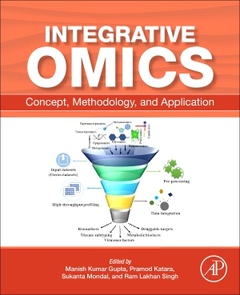Description
Integrative Omics
Concept, Methodology, and Application
Coordinators: Gupta Manish Kumar, Katara Pramod, Mondal Sukanta, Singh Ram Lakhan
Language: English
Subjects for Integrative Omics:
430 p. · 19x23.4 cm · Paperback
Description
/li>Contents
/li>Biography
/li>Comment
/li>
Integrative Omics: Concepts, Methodology and Applications provides a holistic and integrated view of defining and applying network approaches, integrative tools, and methods to solve problems for the rationalization of genotype to phenotype relationships. The reference provides systemic ?step-by-step? coverage that begins with basic concepts from Omic to Multi Integrative Omics approaches followed by applications and emerging and future trends. All areas of Omics are covered, including biological databases, sequence alignment, pharmacogenomics, nutrigenomics and microbial omics, integrated omics for Food Science and Identification of genes associated with disease, clinical data integration and data warehousing, translational omics, technology policy, and society research. This book covers recent concepts, methodologies, advancements in technologies and is also well-suited for researchers from both academic and industry background, undergraduate and graduate students who are mainly working in the area of computational systems biology, integrative omics and translational science.
- From Omics to Multi-integrative Omics Approach
- Types Of Omics Data: Genomics, Metagenomics, Epigenomics, Transcriptomics, Proteomics, Metabolomics and Phenomics
- Biological Omics databases and Tools
- Systematic Benchmarking of Omics Computational Tools
- Pharmacogenomics, Nutrigenomics, and Microbial Omics
- Proteomics: Present and Future Prospectives
- Foodomics: Integrated Omics for the Food and Nutrition Science
- Vaccinomics
- Integrative Omics Approach for Identification of Genes Associated with Disease
- Integrative Omics Approaches for Identification of Biomarkers
- Omics Approach for Personalized and Diagnostics Medicine
- Role of Bioinformatics in Genome Analysis
- Data Management in Cross Omics
- Omics and Clinical Data Integration and Data Warehousing
- Integrative Omics Data Mining: Challenges and Opportunities
- Data Science and Analytics, Modeling, Simulation, and Issues of Omics Data Set
- Emerging Trends in Translational Omics
- Omics Technology for Crop Improvement
- Ecology and Environmental Omics
- Current Trends and Approaches in Clinical Metagenomics
- Bio-molecular Networks
- Machine Learning Fundamentals to Explore Complex OMICS Data
- Omics Technology Policy and Society Research
Pramod Katara is an Assistant Professor at the Centre of Bioinformatics, University of Allahabad. He has 14 years of teaching and research experience. He has published several peer-reviewed papers and has authored several book chapters. He is a member/life member of several national and international scientific societies and attended many symposia/conferences at national and international levels and presented invited lectures/papers there as well as chairing sessions. He has been actively working in the field of bioinformatics to solve various biological issues with the help of computational omics approaches. His current research is focused on the population-specific human genome and transcriptome analysis to predict the pharmacogenomic variant and solve pharmacogenomics related issues).
Dr. Sukanta Mondal is currently working as Principal Scientist, Physiology Division, ICAR-National Institute of Animal Nutrition and Physiology. His major research interests involve cloning, characterization and expression of genes regulating early embryonic loss, molecular characterization and expression of hormone receptors, impact of stre
- Provides a holistic, integrated view of a defining and applying network approach, integrative tools, and methods to solve problems for rationalization of genotype to phenotype relationships
- Offers an interdisciplinary approach to Databases, data analytics techniques, biological tools, network construction, analysis, modeling, prediction and simulation of biological systems leading to ‘translational research’, i.e., drug discovery, drug target prediction, and precision medicine
- Covers worldwide methods, concepts, databases, and tools used in the construction of integrated pathways



